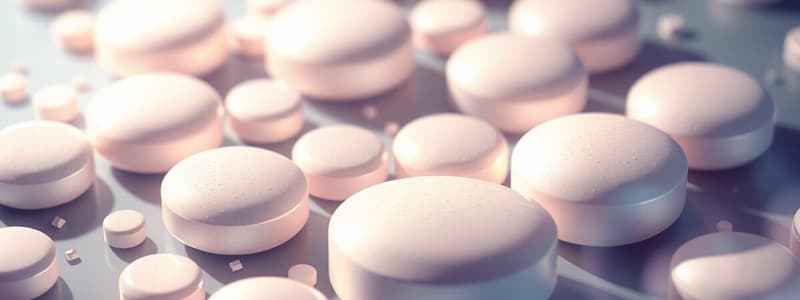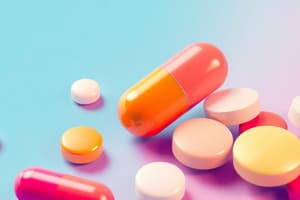Podcast
Questions and Answers
Which of the following is a typical disadvantage of using powder dosage forms?
Which of the following is a typical disadvantage of using powder dosage forms?
- Can be mixed with liquids before use
- Limited to non-potent substances for dispensing (correct)
- Readily dispersed in the body
- Easy to swallow for young children
Granules can contain only one active pharmaceutical ingredient (API).
Granules can contain only one active pharmaceutical ingredient (API).
False (B)
What is one advantage of capsules as a solid dosage form?
What is one advantage of capsules as a solid dosage form?
They provide a rapid onset of action.
______ is a method commonly used to determine particle size.
______ is a method commonly used to determine particle size.
Match each solid dosage form with its characteristic:
Match each solid dosage form with its characteristic:
Which method is NOT mentioned for the preparation of effervescent granules?
Which method is NOT mentioned for the preparation of effervescent granules?
Effervescent granulated salts are used because they taste better than powders.
Effervescent granulated salts are used because they taste better than powders.
What are the three main ingredients in effervescent granulated salts?
What are the three main ingredients in effervescent granulated salts?
Effervescent granules are composed of dry ______ or dry powder particles.
Effervescent granules are composed of dry ______ or dry powder particles.
Match the effervescent granulated salts with their purposes:
Match the effervescent granulated salts with their purposes:
What is the size range of sieves used for handling granules?
What is the size range of sieves used for handling granules?
Granules are typically more irregularly shaped than powders.
Granules are typically more irregularly shaped than powders.
Name one commercially available effervescent granule and its purpose.
Name one commercially available effervescent granule and its purpose.
What is the main purpose of pastes in dermatological applications?
What is the main purpose of pastes in dermatological applications?
Cold creams are suitable for application in hairy parts.
Cold creams are suitable for application in hairy parts.
What are the primary uses of cold creams?
What are the primary uses of cold creams?
The main stiffness in ointments is generally due to the presence of ___________ material.
The main stiffness in ointments is generally due to the presence of ___________ material.
Match the ingredients with their functions in the ointment preparation:
Match the ingredients with their functions in the ointment preparation:
What is a key difference between white ointment and yellow ointment?
What is a key difference between white ointment and yellow ointment?
Air pockets can form during the filling process of an ointment jar.
Air pockets can form during the filling process of an ointment jar.
What is a precaution mentioned for ointment preparation?
What is a precaution mentioned for ointment preparation?
What is the primary function of an emulsifier?
What is the primary function of an emulsifier?
Rayon is an example of an oleaginous base.
Rayon is an example of an oleaginous base.
What are the two types of ointment bases mentioned?
What are the two types of ointment bases mentioned?
Hydrophobic ointments are intended for ___ application.
Hydrophobic ointments are intended for ___ application.
Which ingredient is commonly used as an emulsifier in ointment formulations?
Which ingredient is commonly used as an emulsifier in ointment formulations?
Match the following ointment types with their characteristics:
Match the following ointment types with their characteristics:
Hydrophilic preparations are greasy in nature.
Hydrophilic preparations are greasy in nature.
The primary use of ___ is as a humectant in ointment formulations.
The primary use of ___ is as a humectant in ointment formulations.
What is the method of preparation used for cold cream?
What is the method of preparation used for cold cream?
The yellow ointment is an official preparation according to the USP/NF.
The yellow ointment is an official preparation according to the USP/NF.
What is the main thickening agent used in cold cream?
What is the main thickening agent used in cold cream?
Zinc oxide paste contains not less than _____ percent and not more than _____ percent of ZnO.
Zinc oxide paste contains not less than _____ percent and not more than _____ percent of ZnO.
Match the following ointments with their principal uses:
Match the following ointments with their principal uses:
Which component is NOT found in sulfur ointment?
Which component is NOT found in sulfur ointment?
Cetyl alcohol can be substituted for spermaceti wax in cold cream preparation.
Cetyl alcohol can be substituted for spermaceti wax in cold cream preparation.
Lassar's paste is also known as _____ Oxide Paste with Salicylic Acid.
Lassar's paste is also known as _____ Oxide Paste with Salicylic Acid.
Flashcards are hidden until you start studying
Study Notes
Solid Dosage Forms
- Solid dosage forms include powders, granules, capsules, and tablets designed for medicinal use.
- Powders are dry preparations composed of finely divided particles for internal or external application.
- Topical powders are used externally, oral powders for ingestion, and insufflated powders for body cavities.
- Granules consist of dry aggregates or particles that can contain active pharmaceutical ingredients (APIs) and other ingredients.
- Capsules are gelatin shells containing medicinal agents, suitable for bulky drugs, and easy for infants/children to swallow.
- Tablets are formed by compression or molding and require dissolution for effect; they offer a large surface area and rapid onset of action.
Divided Powders
- Divided powders are mixtures of finely divided solids used internally or externally.
- They can be prepared using the block & divide method.
Effervescent Granules
- Effervescent granules include medicinal agents with acids like sodium bicarbonate, citric, and tartaric acid, creating effervescence when mixed with water.
- They mask undesirable flavors of medicines through carbonation.
Particle Size Determination
- Particle size can be determined through sieving.
Advantages and Disadvantages of Powders
- Disadvantages include limited dispensing to non-potent substances and easy spillage.
- Advantages include ability to mix with beverages, easy dosage adjustments, and potential for rapid onset of action.
Ointments
- Semi-solid preparations for external application to skin or mucous membranes are classified as ointments.
- Types include oleaginous, absorption, water-removable, and water-soluble bases.
Hydrophilic Ointment
- A water-removable ointment used as a protectant, comprising ingredients like methylparaben and propylparaben for antimicrobial properties.
Ointment Filling Procedure
- Steps include filling the jar, using spatulas to fill crevices, revealing air pockets, and ensuring a professional finish.
Cold Creams
- Cold creams serve as emollients and cleansing ointments using a water-in-oil emulsion base.
Zinc Oxide Paste
- Known as Lassar's paste, it contains 2% salicylic acid and 98% zinc oxide, offering antibacterial and antifungal properties.
Sulfur Ointment
- A parasiticide and keratolytic agent used to treat skin conditions like psoriasis and scabies, containing precipitated sulfur and mineral oil.
Key Differences
- White Ointment USP differs from Yellow Ointment USP in ingredient composition, with yellow wax replaced by a white wax in the former.
Stabilizing Agents
- Emulsifiers stabilize emulsions, while humectants like propylene glycol retain moisture.
Studying That Suits You
Use AI to generate personalized quizzes and flashcards to suit your learning preferences.



